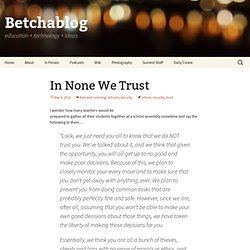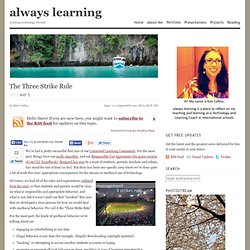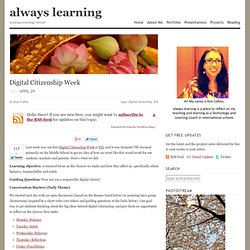

10 Interactive Lessons By Google On Digital Citizenship. 10 Interactive Lessons By Google On Digital Citizenship Added by Jeff Dunn on 2012-07-22 YouTube has a firm place in the current classroom. From Khan Academy’s videos to YouTube EDU and beyond, there’s a reason all these videos are finding a home in schools. In an effort to help keep the ball rolling, Google just launched a set of 10 interactive lessons designed to support teachers in educating students on digital citizenship. A topic obviously quite close to Google’s heart. Google (which owns YouTube) built the lessons to educate students about YouTube’s policies, how to flag content, how to be a safer online citizen, and protect their identities.
Below is a list of lessons, and the recommended flow for delivery. Or you can download the Full Teacher’s Guide or the Full Set of Slides in PDF . The killer feature for this curriculum is the extra features that come with each video. Category: Videos. How To Identify Fake Facebook Profiles [Guide] Facebook is a society of millions of people. So it’s quiet natural that there must be some evil characters exist too. Most of them uses fake profiles to fulfill their goals. Fake profile users mostly spreads spams and vulnerable links. It’s really important to mark fake Facebook profiles to stay safe and sound in the giant social network . So, here some points by which you may identity a fake Facebook profile. 1# Open Profile Most of the fake profiles are fully open. 2# Less Pictures If you are a fake person it’s quiet simple that you can’t get original pictures. 3# Less Interaction You can see a very less real life kind of interaction from the fake profiles.
Reviews and Ratings for Family Movies, TV Shows, Websites, Video Games, Books and Music. COETAIL. Taipei American School: Digital Citizenship. — iKeepSafe. In None We Trust. I wonder how many teachers would be prepared to gather all their students together at a school assembly sometime and say the following to them … “Look, we just need you all to know that we do NOT trust you.

We’ve talked about it, and we think that given the opportunity, you will all get up to no good and make poor decisions. Digital Citizenship Week - Digital Dragons. Developing Our CLC. We are very proud of the process we used to implement our Connected Learning Community here at YIS. Our highest priority was to involve individuals from all stakeholder groups at all levels of the development – from creating our vision, to writing the Responsible Use Agreement, to the implementation plan. Over the course of the 2010 – 2011 school year, we had over 30 people involved from students, to parents, to administrators, to teachers.
The following blog posts highlight the process we went through together: In addition to this process, we also sent a team of 7 teachers to Hong Kong to visit several schools to see 1:1 in action. A huge thank you to HKIS, CDNIS, Discovery College and Renaissance College for allowing us to visit, and to Apple Japan and Apple Hong Kong for helping us arrange the visits. At the beginning of the 2011 – 2012 school year, we implemented our Connected Learning Community program through an innovative 2-day orientation process: Advice from an Expert: Dr. The Three Strike Rule. We’ve had a pretty successful first year of our Connected Learning Community.

For the most part, things have run really smoothly, and our Responsible Use Agreement (the green section of our CLC Handbook), designed last year by a team of students, parents, teachers and admin, has stood the test of time (so far). But there has been one specific area where we’ve done quite a bit of work this year: appropriate consequences for the misuse or unethical use of technology. Of course, we had all of the rules and expectations outlined from the start, so that students and parents would be clear on what is responsible and appropriate behavior, and what is not, but it wasn’t until our first “incident” this year that we developed a clear process for how we would deal with unethical behavior.
We call it the “Three Strike Rule”. For the most part, the kinds of unethical behavior we’re talking about are: Digital Citizenship Week. Last week was our first Digital Citizenship Week at YIS, and it was fantastic!

We focused primarily on the Middle School to get an idea of how an event like this would work for our students, teachers and parents. Here’s what we did: Learning objective: A renewed focus on the choices we make and how they affect us, specifically about balance, responsibility and safety. Guiding Question: How are you a responsible digital citizen?
Conversation Starters (Daily Theme) We started each day with an open discussion (based on the themes listed below) in morning tutor group (homeroom) inspired by a short video (see videos and guiding questions at the links below). Estimating & Tracking Time Spent Online A huge thanks to Rebekah and the MS Student Council for running this entire activity, you guys are amazing!